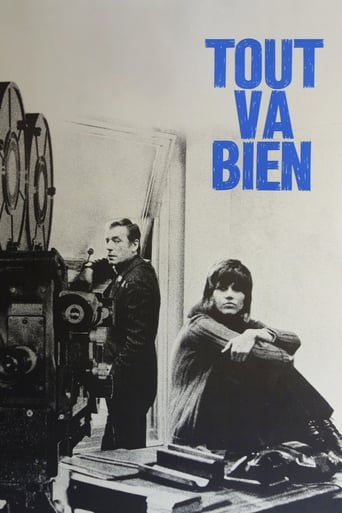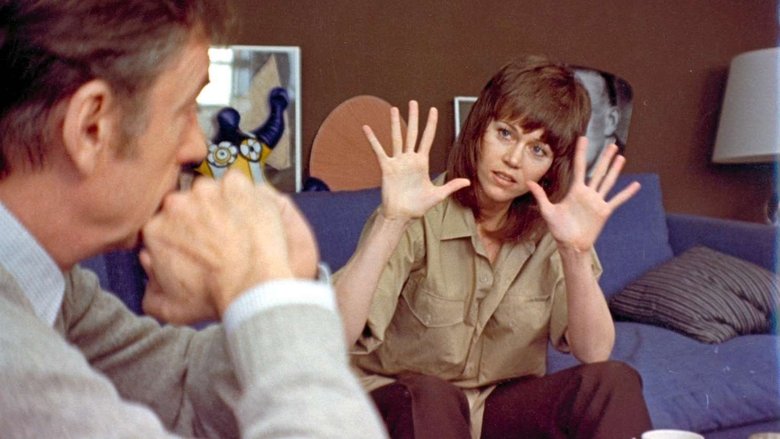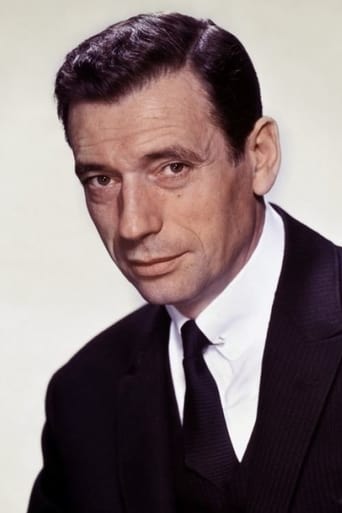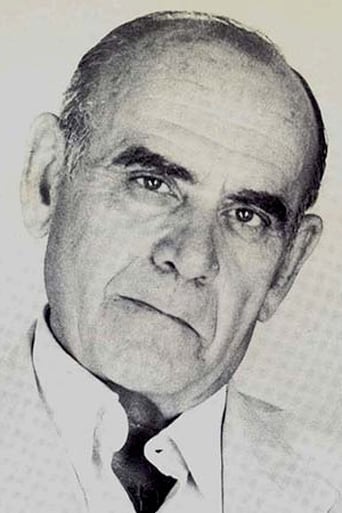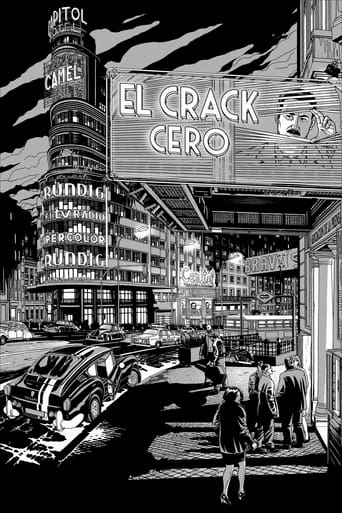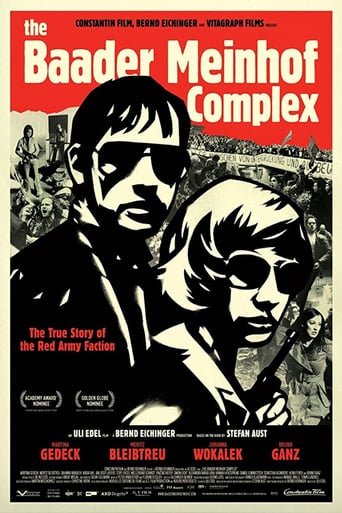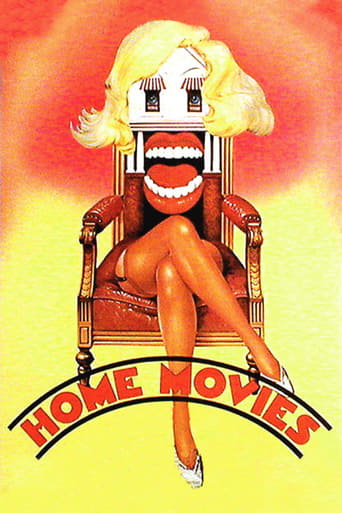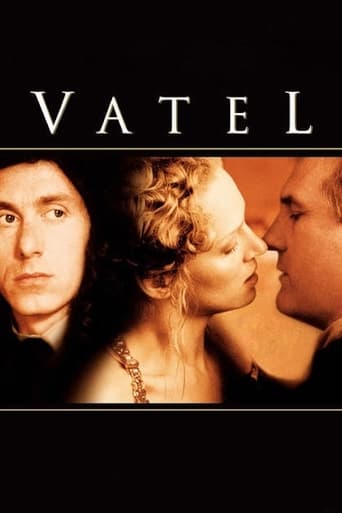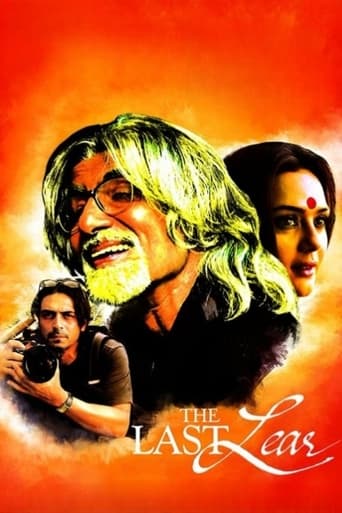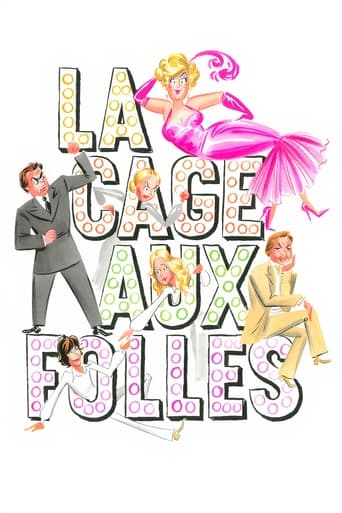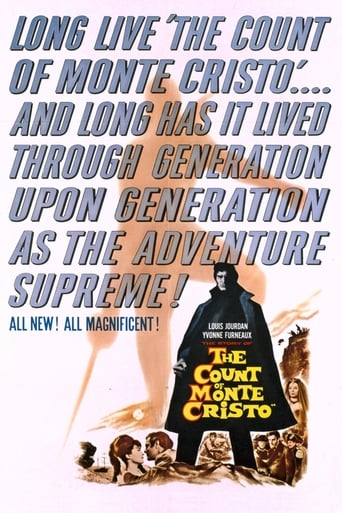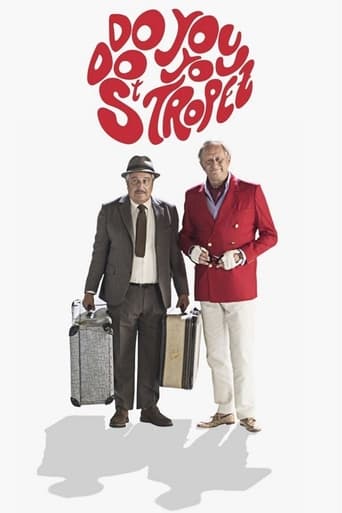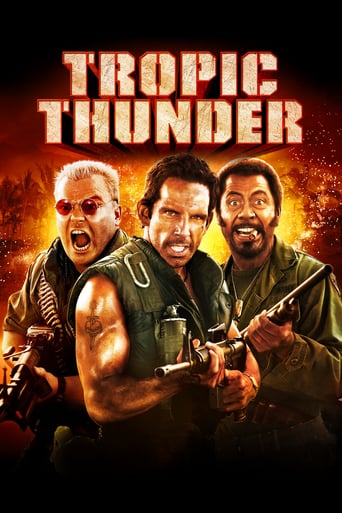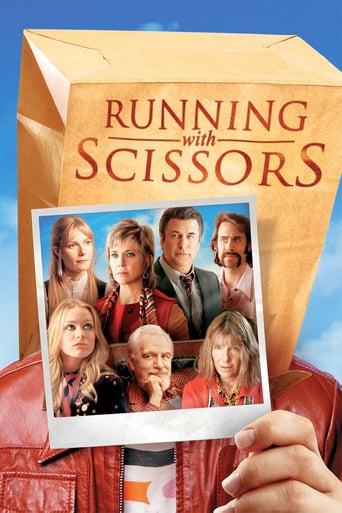Tout Va Bien (1972)
A strike at a French sausage factory contributes to the estrangement of a married filmmaker and his reporter wife.
Watch Trailer
Free Trial Channels
Cast


Similar titles
Reviews
Wonderful character development!
Plot so thin, it passes unnoticed.
Let's be realistic.
Although I seem to have had higher expectations than I thought, the movie is super entertaining.
Tout Va Bien: A Movie Review Well, this divisive film certainly has polarized both those for and against consumerism at its finest: capitalism. One understands through the film that there are a lot of disgruntled people out there in "la Belle France" who basically strive hard to change things, from time to time, when times get rough, or things get intolerable in the political scheme of things. We see from the film, certain things that really catch our visual gaze: the eerie supermarket scene, where shoppers are basically targeted for their purchasing large quantities of goods big enough to feed an entire Catholic household by angry "anti-consumerist" revolutionaries who basically seem out of love with the French version of the supermarket, l'hyper-marché. We see that, not only in this scene but in others, there are many disgruntled workers/student activists, who want desperately to weed out the continuing problems in their society that won't seem to go away, no matter what they do. There are, next, the problems faced by the meat-packing workers who work in the meat-packing plant, who are faced with the problems wrought by working at a meat- packing plant, namely, cancer. Though these workers have a boss who is apparently jolly, cheery, and indeed, corpulent, they have nothing to live for as they are all dissatisfied with their jobs and indeed have to sing songs of protest directly in "leur patron's" face in order to get the message across to him that they "ain't gonna take it anymore." In fact, this movie reminds me so much of "Potiche" in its almost comedic look at French workers striking, so unique and unusual, and even creative in their tactics, are they. In Potiche, a movie which I am probably not even supposed to be reviewing on here, we find that a suburban housewife is tired of her banal existence as a housewife and wants instead to be mayor of her small town (her alternative existence is not very good; all she gets in that life is being chased around by squirrels on her daily jogs, washing dishes and cooking in her apron, and getting cheated on by her cigar- smoking husband). So, we find that, Catherine Deneuve, who plays this feisty house-wife- no-more character, becomes the lead striker in that she address the strikers' concerns whole-heartedly, being the former wife of the deceased husband and woman-chaser, and, like a true fiery politician, changes the way things were previously run at their car-producing- factory (or, something like that). So, while some may immediately label Godard as a boring film-producer who only produces film for his own money-making benefit (and, after all, we all have to earn our bread somehow, don't we?), there are those of us out there who have to acknowledge that the man is a prolific film- producer, and we can't just be jealous if there is nothing we can do about it. In addition, there are scenes in Tout Va bien which makes us question whether really, "Tout Va bien" or, "Tout ne va pas bien, du tout." There are scenes of utter chaos, to be sure, in the supermarket scene, which leads the average viewer to believe in miracles; the shoppers eventually catch on that there is enough chaos in the air that they will not be penalized if they take a little extra of the food and other supplies that the grocery store has to offer. The film-makers who are documenting the strike in this way truly believe that they need to change the mechanical way in which the butchers, or, before that, the factory- worker-butchers, are forced to behave; like robots. But, as we human beings are not robots, we must not be forced to act in this way for too long, or else, we will explode. The building in which many of these workers work, singing rather merry protest songs, cheerfully, along the lines of, "let's behead le patron" and things like that to scare him, aren't pacified by his apparent placidness and seemingly sociable manner and willingness to become one with his inferiors, at least for five minutes. We find that, indeed, the workers hate him, anyway, and will line up outside his door for days, weeks, months, if they have to. One unforgettable moment, anyway, is when the boss actually loses, it, technically, and throws a brick to pee out the window; the chants are surprisingly melodious, in fact, and they verge on rounds, which is quite incredible to me that strikers' songs, supposedly created on the spur of the moment, spun out of workers' minds, can be quite so creative. So, this movie, which starts out patriotic enough, advertising "la France" with the red, white and blue of its flag (it puts its letters in this colorful design), spans the years from 1968, when there were great student protests and somewhat violent riots against the police, to 1972, when the fictional, but largely truth-based strikes take place. The director is very revealing in the ways in which he shoots his scenes, he lays everything bare: his voice supposedly is heard calling the shots, literally, like, "Tout Va Bien, part two, cut," or "Tout Va Bien, scene three, take 5, cut," etcetera, etcetera, until the film really begins. Jane Fonda, and Yves Montand, and Victor Capprioli, also star, so no wonder that this was a popular film, at least during its time. Indeed, this is quite a film, a lot of work went into it.
Jean-Luc Godard's follow-up to the ultra-Maoist Weekend, featuring Yves Montand as a former New Wave filmmaker and his wife Jane Fonda, as they become active in a factory takeover. The film is of course very sympathetic to Marxism and perhaps Leninism, but it's certainly toned down from the blood fest that is Weekend, perhaps regrettably. Godard insists on reinterpreting and imposing entirely new ideas about what a film can and ought to be, in this case an intellectualized espousal of the working class struggle. A few moments of daring misce-en-scene are worth mentioning; fist, Godard includes an awesome cutaway of the factory to reveal the power-dynamics of the uprising within, and an elaborate tracking sequence in a supermarket to reveal the gross stupidity of capitalist consumerism. Tout Va Bien is clearly a step-down from Godard's brilliant features of the 60's, but it's still provocative and worth any cinephile's time.
Godard always makes me think. I'm never indifferent to what he does, with a few exceptions. But many times the excitement about a film by Godard comes in the days after i saw it. This is one of those cases.The setup is simple, he is working on the structural (re)invention of his own films. He probably was by than arrogant enough to believe he was working on the reinvention of the whole cinema (remember the "jean luc cinema godard" signature of Bande a part?). Well there are conclusions which came to affect other works by many other authors, but not always. I think this one is important as a milestone for Godard, in the great picture of his work and it is important to watch on the historical context of cinema than. Many things were happening in the beginning of the seventies, and the main issue was perhaps to clarify the meaning of cinema and its links to real life, the main question the nouvelle vague had raised but never satisfactory answered to that moment. So there are a few works from this period i think should be checked for they show different approaches from different contexts to a similar issue. Think about "F for fake" by Welles, "The conversation" by Coppola, "La nuit américaine" by Truffaut, a few years before Antonioni's Blow up. In the root of all this projects (and some others) is, to my view, this cinematic concern of understanding whether cinema represents life, stages life, or is pure fiction which may influence life. This is probably the least interesting answer of the works i mentioned, but it is still worth a look.The reason why i think this is less rewarding than the films i mentioned above is because Godard, at this point, tended to ruin partially his films by dulling the viewer with his childish half baked conceptions of political ideologies. So he doesn't focus so much on cinema as he does on politics. I like to believe that even than he had the notion of the lack of deepness in the ideas he depicts, but chose to understand that posture as a motivator of certain aesthetics conceptions. So, regarding cinema:The film is in itself a rough structure, which contains several rough structures inside. The result is that we are able to check the mechanics of all the issues we watch: film, politics, and personal relations. Of these three, the only one that matters is the issue film-making. All is denounced so, in the beginning, we have a shot in which someone signs checks to pay film-related services (photography, film, script, etc) followed by an off dialog translating a stylization of the beginning of the film making process. Than we get a beautiful hole sequence inside a factory. We see the factory as a section, so we are able to simultaneously get what happens in every division of it (this structural denouncement was to be used in different context by von Trier, with Dogville). Even before we are allowed to understand we are watching a set, never for a moment one believes to be watching a real location (the colors are those of the french flag). The performances by the workers are also ostensibly stagy, so one doesn't suspect we are watching real life being captured. So, fiction is announced. Like Truffaut in "la nuit américaine", Godard finally assumes that film has a kind of dynamics which has not that much to do with life, and the role of cinema is not to capture life, but to create a life of its own, which has roots in real world, but has its own inner laws.Than Godard ruins partially the experience. He assumes the political speech. He places still on the factory context several workers (actors performing workers, good to remember) unleashing terribly boring monologues (at least from by point of view, i'm not a May 68' guy, older folks please comment on this) concerning their rights and their complaints. He places the actors talking directly to the camera, assuming once more there is a filming being made. Later he even assumes we can make our own film, when he puts Montand talking side by side with a camera pointing at us.The third and clearly least worked out issue is the personal relation between Fonda and Montand. It is also told caring for the structure of the thing. So everything is stylish, cliché, but it is supposed to be like that. We end the film with possibilities on how their relation ends.This is a cinematic sketch, like the demo of a film. I like that attitude, i like the aspect of "unfinished" project, roughness, provisional look of the film. It's as if we were part of the process. And indeed we are.Oh and there is a shot, that alone makes this worth watching. The relatively famous shot on a supermarket. We have the camera moving for about 15 minutes over a straight line, we watch the normal life of a supermarket, stuff happening, a staged "ideological" fight. Just that. The camera comes and go, the line it follows is parallel to the line of register boxes which register the clients shopping. We see the things at the level of the registers box workers. It's just beautiful. It's cinema, maybe not the cinema of truth, but true cinema. Really.My opinion: 4/5
Going through the French language and its subtitles, I was amazed about the reason of this film, and since I had been to France over 5 times, I was starting to like this film more and more. The film is Jean-Luc Godard's melodramatic story with some twinges of independent comedy about the rise of the new leftists in France in 1972....and its effects on not only France...but all those in other parts of the world whose only way of bettering themselves is through socialist struggle.The film also remarks the year 1972 to some of the major events that crippled the world in 1968, like the MLK assassination, the Black Power gesture at the Mexico City summer Olympic games as well as the violent crackdown on protesters at Tlatelco University, and the massive antiwar outcry during the American involvement in the Vietnam War.Although I never researched Godard's history, this film was probably inspired by Hugo's "Les Miserables" and the socialist uprising in Lyon, France in the 1830s.One of the first scenes I adored is the crackdown on leftist strikers who were protesting at a factory at the town of Filns. A bus that carried the strikers to the protest was set on fire by police and blows up, and the strikers walk up at you with hands behind their heads. A voice-over tells some places in France that had similar crackdowns, like Dunkerque and Palais De Sport. That scene is an allusion to the Jews who were sent off to concentration camps in World War II.But there is one person who shocked me in the film---but she is not a French actor. Her name is Jane Fonda. She did speak some English in the film--sometimes without the usual French subtitles put in. This was an allusion to the Americanization of France that was temporarily halted around 1990.Jane Fonda played the role in the film an American reporter trying to deal with the events leading to the explosive leftist struggle in France in 1972. It was quite remarkable for this lady who could be almost the antithesis of Susan Sarandon, since during the Vietnam War, Jane went to Vietnam to temporarily go on the side of those Vietnamese who were fighting the Americans. At least, the film did not mention anything about the war in Vietnam. If that was so, the whole film would be completely ruined by American antiwar backlash.I especially adore the scene at the Carrefour supermarket. Here, Jean-Luc Godard does a filming technique I call "the slow-sliding pan". Godard uses the big expanse of this super-store to tell multiple events. There was Jane Fonda, who is right in the middle of the store chaos, witnessing a crowd of onlookers surrounding a small band of members who are trying to enlist bystanders to the French Communist Party. One of the group's leaders shouts "Join The French Communist Party! Four-Thirty Francs Down from Five-Fifty Francs! Better life!" It seems like leftists in France don't like it when inflation runs out of control.As the bystanders discount the group, the strikers that were cracked down at Filns appear from the back-door entrance of the store, strike back and tell the bystanders that all of the store's items are "gratuit"--or free. The bystanders and the strikers then fill up the shopping carts and try to get out of the store. This was techincally looting---not just shoplifting---and the cops later come in, stopping some of the stealers with their batons but several of them get away with the loot. The result is still another allusion--this time to the looting after Hurricane Katrina.When at the end of the flick you hear "France...1972.....Me.....You", as Godard pans the camera on an an old junkyard on a cloudy day, then a brick wall, and then the same junkyard again, Godard is telling us that the leftist struggle in that year is a warning for all people who protest--not just the French. Protest way too far and you will suffer devastating consequences. (Like what happened when the Red Brigade group terrorized Italy in the 1970s.) Protest gently and you may get what you really deserve. Therefore, what I like overall in the film is how France faired in the early 1970s. If you like to see what was really on French peoples' minds in that time, this film is just for you!

